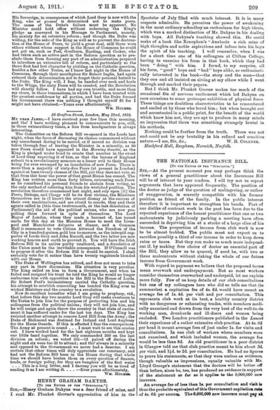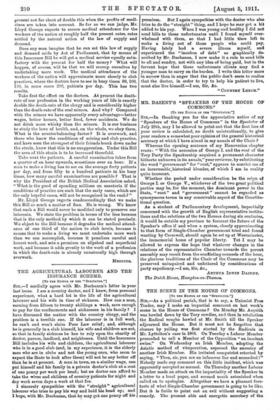THE NATIONAL INSURANCE BILL. [To mos EDITOR OF TSB "SPECTATOs.")
Sra,—At the present moment you may perhaps think the views of a general practitioner about the Insurance Bill will be of interest to your readers. I will try not to repeat arguments that have appeared frequently. The position of the doctor as judge of the question of malingering, or rather of exaggeration, is scarcely compatible with his former position as friend of the family. In the public interest therefore it is important to strengthen his hands. Part of our dislike of contract work in the past has been due to the repeated experience of the honest practitioner that one or two malcontents by judiciously packing a meeting have often succeeded in depriving him at a stroke of a large slice of his income. The proportion of income from club work is now to be almost trebled. The public must not expect us to sacrifice possibly a third of our income in order to keep down rates or taxes. But they can make us much more independ- ent if, by making free choice of doctor an essential part of the Bill, they allow us to quarrel, if need be, with two or three malcontents without risking the whole of our future income from Government work.
With regard to payment we believe that the proposed terms mean overwork and underpayment. But as most workers consider themselves overworked and underpaid, let me explain more fully. Few of us keep details of our club consultations but one of my colleagues here who did so tells me that (to summarize) a capitation fee of 4s. 6d. would have meant an average fee of Is. 4d. per visit and per consultation. This represents club work at its best, a healthy country district with no dangerous or exhausting trades, with members medi- cally examined and drawn from the very best of the well-to-do working men, drunkards and ill-doers and women being excluded. Two London practitioners published in the Lancet their experience of a rather extensive club practice. At 4s. 6d per head it meant average fees of just under ls. for visits and
consultations. In one club of workers where members were not examined, and which included women, the average fee would be less than 8d. An old practitioner in a poor district in Glasgow told me that club practice meant to him about 3d. per visit, and ltd. to 2d. per consultation. He had no figures to prove his statements, so that they were useless as evidence, though valuable as impressions, equally valuable with Mr. Lloyd George's statement that the doctors will be better of than before, since be, too, has produced no evidence in support of the statement so far as it applies to the 9,000,000 new insurers.
An average fee of less than Is. per consultation and visit is thus the probable equivalent of this Government capitation rats of 4s. 6d. per annum. The 9.000.000 new insurers must pal aft_
present not far short of double this when the profits of medi- cines are taken into account. So far as we can judge, Mr. Lloyd George expects to secure medical attendance for the -workers of the nation at roughly half the present rates, rates settled by the natural action of the law of supply and demand.
Does any man imagine that he can set this law of supply and demand aside by Act of Parliament, that by means of this Insurance Bill he will get a medical service equally satis- factory with the present for half the money ? What will happen, of course, will be that we will recoup ourselves by undertaking more work. The medical attendance of the workers of the nation will approximate more closely to club practices, where the doctors have to see in busy times 80, 100, 150, in some cases 200, patients per day. This has two results.
Take first the effect on the doctors. At present the death- rate of our profession in the working years of life is exactly double the death-rate of the clergy and is considerably higher than the death-rate of the coal miners. And why ? Compared with the miners we have apparently every advantage—better wages, better houses, better food, fewer accidents. We do not drink more whisky than the miners. It is our business to study the laws of health, and, on the whole, we obey them. What is the counterbalancing factor ? It is overwork, and those who know the conditions of mining and club practice, and have seen the strongest of their friends break down under the strain, know that this is no exaggeration. Under this Bill the area of this strain is to be increased threefold.
Take next the patients. A careful examination takes from
a quarter of an hour upwards, sometimes over an hour. If a man to make a living has to see on the average forty patients per day, and from fifty to a hundred patients in his busy times, bow many careful examinations are possible ? That is why the President of the British Medical Association asked, " What is the good of spending millions on sanatoria if the conditions of practice are such that the early cases, which are the only hopeful cases, will not be recognized in the rush? "
Mr. Lloyd George regrets condescendingly that we make this Bill so much a matter of fees. He is wrong. We know that such a Bill would never be modified only to preserve our interests. We state the problem in terms of the fees because that is the only method by which it can be stated precisely. We object to the Bill because it degrades the medical attend- ance of one third of the nation to club levels, because it means that to make a living we must undertake more work than we can accomplish, because it penalizes careful and honest work, and sets a premium on slipshod and superficial work, and because it adds greatly to the work of a profession in which the death-rate is ah-eady unnaturally high through overwork.
MaDrens.







































 Previous page
Previous page